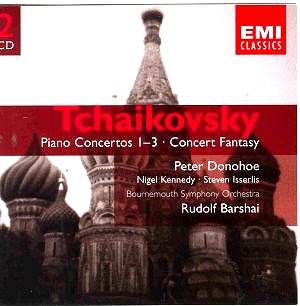Having been won round
to the Second Piano Concerto during
the 1970s by Igor Zhukov’s Melodiya
recording I have a special and possibly
obtuse interest in the work. Zhukov
adopted the Siloti cuts - Donohoe plays
the work complete. I missed the Donohoe
version first time around when it was
part of his first access of pianistic
fame in the 1980s. Although the Second
Concerto was rosetted by Penguin and
acclaimed by Gramophone I come to these
recordings for the first time.
The acoustic is very
reverberant; listen to the decay at
the end of the last movement of the
Tchaikovsky First. The immersion of
the Chopin-like ornamentation of the
Concert Fantasy into this context produces
a ‘swimmy’ effect which is not ideal.
This also afflicts the First Concerto.
In a field that is rapaciously competitive
you could not viably claim that this
set was a library version. It is however
typically exciting and Donohoe’s aptitude
for brilliance coupled with a burly
strength can never once be doubted.
We are in another world
when it comes to the Second Concerto.
Not only is the sound picture sharper,
stronger, closer, tactile and realistic
but there is also an overwhelming sense
of occasion. It comes as no surprise
to hear that the Second Concerto was
recorded first. The acclaim that recording
met resulted in or affirmed a decision
to record the complete cycle. When the
life of Peter Donohoe comes to be written
this recording will be seen for what
it is - a landmark event. The first
movement’s plunging celebratory mood
contrasts with the soloistic andante
non troppo laced with Tchaikovskian
sentiment. Pre-cross-over Kennedy and
pre-celebrity Isserlis create a contemplative
reflective pool which exercises a velvety
grip on the imagination. The exciting
Allegro con fuoco flounces in
with all flags flying and gallops along
in a way that suggests Saint-Saëns’
Second Piano Concerto. Exhilarating
stuff.
After a fallow period
(at least so far as the catalogue is
concerned) the present day Donohoe now
moves into another phase with his British
Piano Concerto series for Naxos. This
was trailed by his Finzi and Walton
contributions over the last couple of
years. The British series started proper
with his two Rawsthorne concertos but
his Bliss concerto comes soon preceded
by a concert performance in Birmingham.
I do hope that he will be tackling the
Bax Winter Legends, the Ireland, Arnell,
Stanley Bate, Bowen, Alan Bush, Carwithen,
Albert Coates (should be right up his
street), Coke (reportedly Rachmaninov-like),
Gipps, the pairs of concertos by Reizenstein,
Merrick (old-fashioned) Josephs and
Jacobs, Williamson (3), Wordsworth and
intriguingly the five or so neo-Schumann
concertos by Gaze Cooper.
A chance to come to
terms with possibly the finest Tchaikovsky
2 ever - an object lesson both as an
interpretation and as a recording. If
you need yet more ‘heat’ and risk-taking
then try to track down the Pavane CD
(ADW 7387) of Mikhaïl Petukhov
(piano) with the Buenos Aires PO/Alexander
Anissimov - incandescent performances
recorded live in 1993 and 1994. If you
want recommendations for the Tchaikovsky
1-3 in studio versions then go for the
EMI Gilels or if you want something
with eccentric character then opt for
Postnikova and Rozhdestvensky on Universal-Decca.
This Gemini series
is proclaimed as the vehicle for the
‘EMI Treasures’. In the case of the
Second Concerto this is not hyperbole.
As for the rest everything is enjoyable
though has been bettered elsewhere in
a field crowded with competition. The
standard price for this set in the UK
is £8.50. In fact you can order these
Geminis from Amazon at £7.99 a piece;
less than four pounds a disc. EMI strike
back at Apex and Regis. The listeners
benefit.
Rob Barnett
